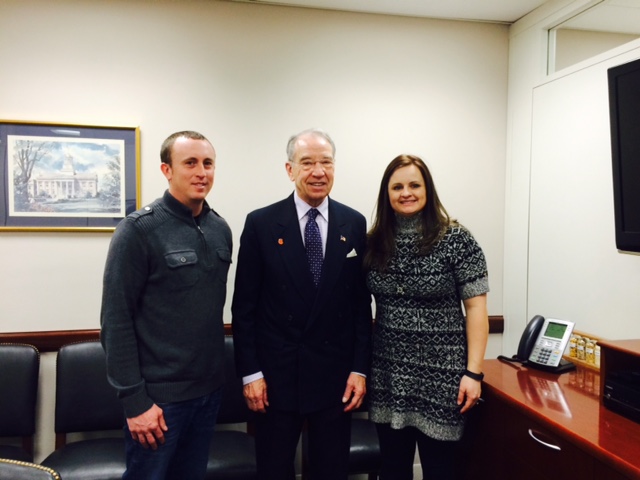
(L-R) Cody Lindsey, Senator Chuck Grassley and Maggie Lindsey, RN discussed important pending kidney legislation.
(Corydon, March 9, 2015) Maggie Lindsey, RN and her husband, Cody, were selected by the National Kidney Foundation to attend the annual patient summit March 2-5, 2015, to represent kidney patients and healthcare workers in Washington, D.C. The group of 100 included kidney patients, family members and healthcare workers. One day was dedicated to speaking directly with congressmen and women and their health care advisors about kidney awareness.
Cody was diagnosed in 2013 with IgA Nephropathy, an auto immune disease where his antibodies attack his kidneys and is currently in stage 2 kidney disease. Ironically, Maggie has been a dialysis nurse for 10 years, treating patients with end stage kidney disease that are on hemodialysis. She is the Dialysis Unit Director at Wayne County Hospital in Corydon, Iowa.
The Lindsey’s were able to meet with Iowa representatives including Senator Grassley, Dave Loebsack’s health advisor, and Joni Ernst’s administrative aid among other advisors to rise kidney disease awareness, promote the need for early detection and more research, and stress the need for increases to the Medicare budget.
Maggie describes the experience as, “An opportunity to explain the harsh realities of kidney disease to important decision makers. Our Iowa representatives were the most welcoming and accessible. They really took the time to listen and work with us.”
Currently over 26 million people in the United States have kidney disease, which means 1 in 9 American adults are estimated to have chronic kidney disease (CKD), although most don’t know and the numbers are rising.
Some of the key concepts that the Kidney Foundation brought forth to the congressional representatives were:
1. Ensuring that a provision in the draft 21st Century Cures Bill to address 21st Century Chronic Diseases specifically directs the Secretary of Health and Human Services to conduct a study on diagnosis, progression and outcomes in Chronic Kidney Disease (CKD) and funds such a study, by contacting CMS and asking them to restore risk adjustment payments to Medicare Advantage for CKD as these payments create opportunities for earlier detection, diagnosis and management of CKD
2. To cosponsor the Living Donor Protection Act when it is reintroduced by Representative Nadler this year. This bill will prohibit insurance companies from this type of discrimination and will extend employment protection to living donors under the Family Medical Leave Act.
3. Strengthen the End Stage Renal Disease (ESRD) Medicare program to allow better access to:
• Permit dialysis patients the choice to enroll in Medicare Advantage
• Extend Medicare coverage of immunosuppressive drugs for the life of the caps on the amount we can be required to pay out of our own pockets for medical care and may make care more affordable for kidney transplant. Currently, Medicare coverage ends 36 months post-transplant for those under age 65.
According to Maggie, the biggest misconception people have is that it kidney disease will not happen to them. The reality is that diabetes and hypertension are two of the leading causes to kidney disease, both of which are extremely prevalent in today’s population. Some kidney failure is genetic but the majority of cases are not. Prevention is possible by educating yourself, know your blood pressure, know your family history of kidney problems (if any), make healthy lifestyle choices and take medications as prescribed. Following your provider’s instructions is important.
A typical dialysis treatment will take 3-4 hours depending on the person’s weight, and requires treatment 3 times a week for the remainder of a person’s life. There is no typical age for kidney failure. It even affects the very young with special pediatric dialysis treatment units available for those special cases.
Maggie and her team are acutely aware of how difficult these treatments are for their patients. She said, “It’s important for us to bring them joy when they come here so they will look forward to coming back for their next treatment.”
You can join Maggie and her family in the Central Iowa Kidney Walk on Saturday, May 9th at the Iowa State Fair Grounds. Anyone can join their team as a walker on “The Lindsey Team” or give a donation to the National Kidney Foundation by going to donation.kidney.org This is a fun family event with games and music starting at 9:00 a.m. and the walk at 10:00 a.m.
To learn more about kidney health and illness or to make a contribution, go to the National Kidney Foundation web page at. https://www.kidney.org/. For information on the Wayne County Hospital Dialysis Unit please contact Maggie Lindsey, RN, Director at 641-872-5317.

